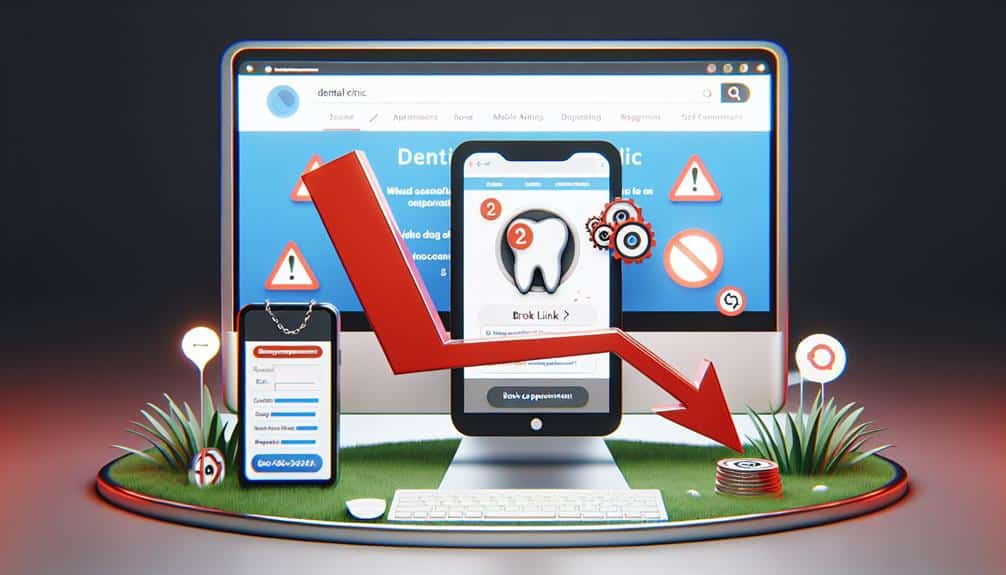Are you still using outdated dental SEO strategies that are as ancient as the dinosaurs?
Well, it’s time to step into the modern era and avoid these common mistakes that could be hurting your online visibility.
From neglecting local SEO to failing to optimize your website for mobile devices, there are several pitfalls you need to steer clear of.
So, buckle up and get ready to discover the secrets to improving your dental practice’s online presence and attracting more patients.
Key Takeaways
- Neglecting local SEO strategies can hinder the visibility of dental practice websites in local searches.
- Having a mobile-friendly website is crucial for dental SEO, as more people are using smartphones and tablets to search for information.
- Creating unique and relevant content establishes expertise in the dental field and improves search engine rankings.
- On-page optimization, including thorough keyword research and optimizing meta tags and descriptions, is essential for improving website search engine rankings.
Ignoring the Importance of Local SEO
If you want to attract more local patients to your dental practice, you can’t afford to ignore the importance of local SEO. Local SEO strategies are essential for optimizing dental practice websites and ensuring that your practice appears in local search results.
When potential patients in your area search for a dentist, they’re most likely to use location-specific keywords like ‘dentist near me’ or ‘dentist in [your city].’ By implementing local SEO strategies, such as claiming your Google My Business listing, optimizing your website with location-specific keywords, and ensuring consistent NAP (Name, Address, Phone Number) information across online directories, you can increase your visibility in local searches.
Optimizing your website with location-specific keywords is crucial. Incorporate keywords like ‘dentist in [your city]’ or ‘family dentist [your city]’ in your website content, meta tags, and page titles. This will help search engines understand the relevance of your website to local searches and improve your organic rankings.
Claiming and optimizing your Google My Business listing is another important local SEO strategy. This listing appears prominently in local search results, providing potential patients with essential information about your practice, such as your address, phone number, website, and business hours. Ensure your listing is accurate and up-to-date, and encourage patients to leave reviews, as positive reviews can boost your rankings.
Consistency is key when it comes to NAP information. Make sure your practice’s name, address, and phone number are consistent across all online directories, including your website, Google My Business, Yelp, and other relevant platforms. Inaccurate or inconsistent NAP information can confuse search engines and potential patients, negatively impacting your local SEO efforts.
Ignoring the importance of local SEO can result in missed opportunities to attract local patients to your dental practice. Implementing local SEO strategies and optimizing your website can significantly increase your visibility in local search results, helping you attract more local patients and grow your practice.
Not Optimizing Website for Mobile Devices
When optimizing your dental practice website, it’s crucial to ensure that it’s mobile-friendly. With more and more people using their smartphones and tablets to search for information, having a mobile-friendly website is essential for your dental SEO strategy.
Mobile friendly design refers to the layout and functionality of your website when accessed on a mobile device. If your website isn’t optimized for mobile devices, it can lead to a poor user experience and lower search engine rankings.
One way to achieve a mobile-friendly website is through responsive web design. Responsive web design allows your website to adapt and adjust its layout based on the screen size of the device it’s being viewed on. This means that your website will look and function properly on both desktop and mobile devices.
Neglecting to Create Unique and Relevant Content
One common mistake in dental SEO is failing to create unique and relevant content. Content creation strategies play a crucial role in improving your website’s visibility and attracting more visitors. When it comes to dental SEO, it’s not just about optimizing your website for search engines; it’s also about providing valuable information to your target audience.
Creating unique and relevant content helps establish your expertise in the dental field and builds trust with potential patients. By offering informative articles, blog posts, and videos, you can address common dental concerns, provide tips for maintaining oral health, and showcase your dental services. This not only helps you rank higher in search engine results but also enhances the user experience.
The importance of user experience can’t be overstated. When visitors come to your website, they expect to find helpful and engaging content. If your content is generic, outdated, or irrelevant, it reflects poorly on your practice and may lead to a high bounce rate. On the other hand, when you consistently produce high-quality content that addresses the needs and interests of your target audience, you increase the likelihood of attracting and retaining visitors.
To optimize your dental SEO, focus on creating unique and relevant content that provides value to your audience. Invest time in understanding their needs, preferences, and pain points, and tailor your content accordingly. By doing so, you’ll not only improve your search engine rankings but also establish your practice as a trusted source of dental information.
Overlooking the Importance of On-Page Optimization
To further optimize your dental SEO and enhance your website’s visibility, it’s crucial not to overlook the importance of on-page optimization. On-page optimization involves optimizing various aspects of your website to improve its search engine rankings.
Here are four key elements of on-page optimization that you should focus on:
- Importance of keyword research: Conducting thorough keyword research is essential for identifying the right keywords to target on your website. By incorporating relevant keywords into your website’s content, meta tags, and headings, you can improve your chances of ranking higher in search engine results.
- Optimizing website speed: Slow loading times can negatively impact your website’s user experience and search engine rankings. Ensure that your website is optimized for speed by compressing images, minimizing code, and utilizing caching techniques.
- Title tags and meta descriptions: Optimizing your title tags and meta descriptions with keywords can improve your website’s visibility in search engine results. Craft compelling and concise titles and descriptions that accurately represent your content and entice users to click through to your site.
- User-friendly URLs: Creating clean and descriptive URLs that include relevant keywords can make it easier for search engines and users to understand the content of your webpages.
Failing to Optimize Meta Tags and Descriptions
Failing to optimize meta tags and descriptions can significantly hinder your dental website‘s visibility and search engine rankings. Meta tags and descriptions play a crucial role in informing search engines and users about the content of your web pages. By neglecting to optimize these elements, you miss out on valuable opportunities to improve your website’s performance.
Firstly, meta tags provide search engines with information about your web pages. The title tag, in particular, is essential for search engine optimization (SEO) as it tells search engines the primary topic of your page. Including relevant keywords in your title tags can help improve your website’s visibility in search engine results.
Secondly, meta descriptions appear as snippets in search engine results pages (SERPs), giving users a preview of your page’s content. By crafting compelling and informative descriptions that accurately reflect the content, you can increase the chances of users clicking on your website.
To optimize your meta tags and descriptions, consider incorporating keywords that reflect both your dental services and the intent of potential patients. This can help attract the right audience to your website. Additionally, ensure that your meta tags and descriptions are concise, clear, and engaging to entice users to click through to your site.
Neglecting to Build High-Quality Backlinks
Neglecting to prioritize the building of high-quality backlinks can severely hinder the online visibility and search engine rankings of your dental website. Building strong connections through high-quality backlinks is crucial for the success of your dental SEO strategy.
Here are four important reasons why you shouldn’t ignore this aspect:
- Boosts website authority: Backlinks from reputable and authoritative websites signal to search engines that your website is trustworthy and relevant. This can lead to higher search engine rankings, increased organic traffic, and more patients finding your dental practice online.
- Increases referral traffic: When other websites link to your dental website, they’re essentially recommending your content to their audience. This can result in referral traffic, where potential patients visit your website through these backlinks, increasing your chances of converting them into actual patients.
- Improves indexing: Backlinks help search engine crawlers discover and index your web pages faster. When search engines find quality backlinks pointing to your site, they’re more likely to crawl and index your content, improving your website’s visibility in search results.
- Enhances credibility and reputation: Backlinks from reputable sources act as endorsements for your dental practice. When other authoritative websites link to your content, it increases your credibility and reputation in the eyes of both search engines and potential patients.
To build high-quality backlinks, consider implementing effective link building strategies such as guest blogging, creating shareable content, and reaching out to relevant industry influencers or dental organizations.
Building strong connections through backlinks is an essential component of dental SEO and shouldn’t be neglected.
Not Tracking and Analyzing Website Performance and SEO Efforts
If you want to maximize the effectiveness of your dental SEO strategy, it’s essential to regularly track and analyze your website’s performance and SEO efforts.
Tracking and analyzing website traffic is crucial in understanding how well your dental website is performing and whether your SEO efforts are yielding positive results. By monitoring website traffic, you can identify which pages are attracting the most visitors, where visitors are coming from, and how long they’re staying on your site. This information can help you identify areas for improvement and optimize your website accordingly.
Measuring SEO success goes beyond just tracking website traffic. It involves analyzing various metrics such as keyword rankings, organic search visibility, and conversion rates. By monitoring these metrics, you can determine whether your SEO efforts are driving targeted traffic to your dental website and converting visitors into patients.
Additionally, tracking and analyzing your SEO efforts allows you to identify trends and make data-driven decisions to optimize your dental SEO strategy.
To track and analyze your website’s performance and SEO efforts, you can use tools like Google Analytics and Google Search Console. These tools provide valuable insights into your website’s performance, including information on website traffic, keyword rankings, and user behavior. By regularly monitoring and analyzing these metrics, you can make informed decisions to improve your dental SEO strategy and achieve better results.
Frequently Asked Questions
How Does Local SEO Impact Dental Practices?
Local SEO has a significant impact on dental practices. It helps improve online visibility, attract more local patients, and increase website traffic. By incorporating effective online marketing strategies, dental practices can enhance their dental marketing efforts and reach a wider audience.
What Are the Consequences of Not Optimizing a Dental Website for Mobile Devices?
Not optimizing your dental website for mobile devices can result in a poor user experience and lost potential patients. Mobile website design is crucial for attracting and retaining visitors.
Why Is Unique and Relevant Content Important for Dental Seo?
Unique and relevant content is crucial for dental SEO. It attracts more visitors and increases your chances of ranking higher in search results. Dental blogging and proper keyword research are essential for reaping the benefits.
How Does On-Page Optimization Affect a Dental Website’s Search Engine Rankings?
Improving your dental website’s search engine rankings starts with on-page optimization. By conducting thorough keyword research and implementing strategies for faster loading speed, you can boost your website’s visibility and attract more potential patients.
What Are the Benefits of Optimizing Meta Tags and Descriptions for Dental Websites?
Improving website visibility and increasing organic traffic are the benefits of optimizing meta tags and descriptions for dental websites. By utilizing relevant keywords, you can attract more potential patients and improve your search engine rankings.
Conclusion
Congratulations on reaching the end of this informative journey! Remember, just like a bright smile, a successful dental SEO strategy requires attention to detail.
Avoid the common pitfalls of neglecting local SEO, optimizing for mobile devices, creating unique content, on-page optimization, meta tags, descriptions, high-quality backlinks, and tracking website performance.
Stay on top of these tasks, and your dental practice will shine like a dazzling set of pearly whites in the vast online landscape.
Keep smiling and keep optimizing!

Suraj Rana is a renowned Dental SEO Expert, deeply committed to elevating dental practices in the online landscape. With a profound understanding of technical SEO, he specializes in tailoring on-page optimization strategies specifically for the dental industry. Suraj’s extensive experience spans across various sectors, but his passion truly lies in transforming the digital presence of dental clinics. His expertise in dental-specific search engine optimization, combined with a data-driven approach, empowers him to develop strategies that significantly increase organic traffic, enhance search engine rankings for dental-related keywords, and ultimately drive business growth for his dental clients. Suraj Rana’s unique blend of SEO skills and dedication to the dental field make him an invaluable asset to any dental practice looking to thrive online.


